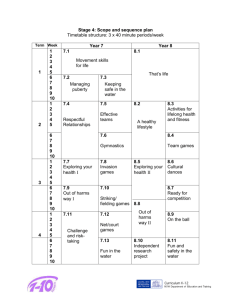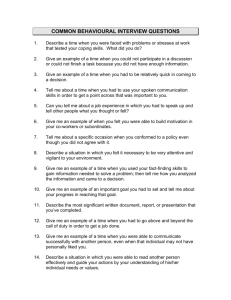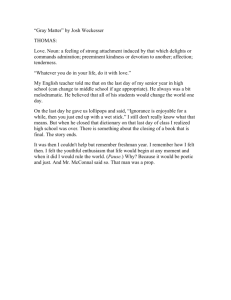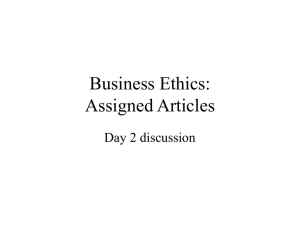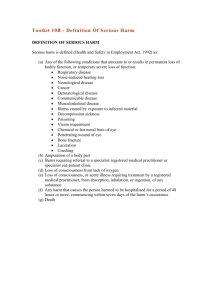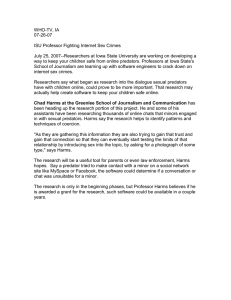African Regional Conference on Child Online Protection (ACOP): “Empowering
advertisement
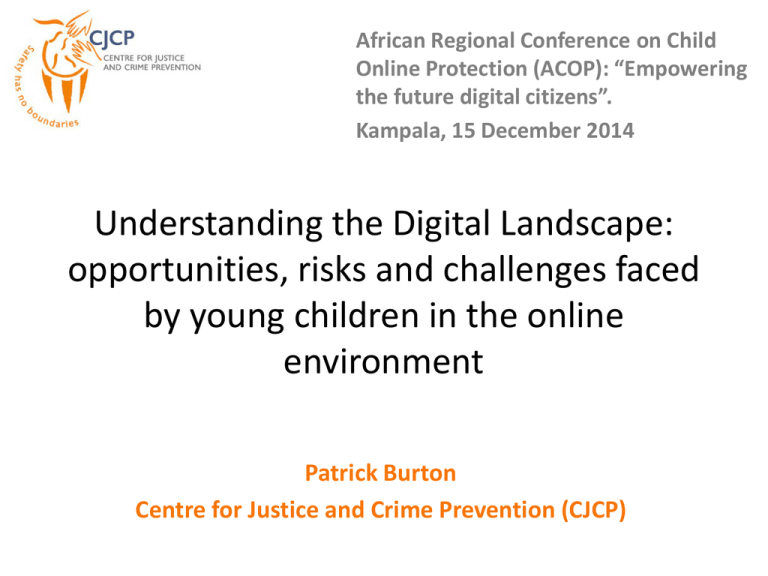
African Regional Conference on Child Online Protection (ACOP): “Empowering the future digital citizens”. Kampala, 15 December 2014 Understanding the Digital Landscape: opportunities, risks and challenges faced by young children in the online environment Patrick Burton Centre for Justice and Crime Prevention (CJCP) “…the internet is often criticized as a sinister world where naïve teens fall prey to various assorted malevolent forces, or teens are vilified for using the internet to indulge their darkest and widest impulses below the radar of parental authority.” 2 (Boyd, Ryan & Leavitt (2011)) 2 Key Questions How valid are the assumptions being made in policy direction through limited consultation processes? To what extent are children’s online experiences reflected in current policy direction? How to strengthen, promote and articulate children’s voices into these policy processes? Is child consultation in its current form adequate for policy purposes. 3 Use of social media and ICT in SA Own or have access to a mobile phone 81.1 Own or have access to a computer, ipad, tablet 54.3 Ever access to the internet on your mobile phone 46.2 Ever use Instant Messaging through your mobile phone 42.3 Have your own social networking page 30.9 Ever participate in online chatrooms 4 24.4 Ever host or contribute to a website/blog 10 Ever use Instant Messaging through a computer 9.5 Experiences of Online Violence Experienced some form of online violence or aggression in previous 12 months Had an 'online fight' with someone where angry and rude language was sent in a chat room or social networking page via the computor or mobile phone 20.9 14 Had rude and insulting messages about you sent via computer or mobile phone 7.8 Had messages sent or posted about you that were hurtful, with the intention of damaging reputation or friendship 3.8 Had someone share secrets or embarrassing pictures or information about you online without your permission 3.2 Had someone use your account and pretend to be you by sending messages etc and trying to ruin your reputation 3 2.5 Been threatened with harm or intimidated by someone online Had someone send sexually explicit images or messages about you by using a phone or computer 2.3 Marks dropped because of it 20.3 Felt sad & hurt 21.5 I cried 24.6 Missed school because of it 24.6 Blamed myself 30.8 Had difficulty concentrating 31.4 Felt anxious 46.5 Felt afraid 53.2 felt embarrassed 59.1 felt angry 78.8 0 10 20 30 40 50 % 60 70 6 80 90 Boys 13.9 Girls 10.3 Online “risky” behaviour % 20.3 12.1 6.2 4.3 Ever lied about your Ever met, in real life, Ever sent a txt about Ever posted something age online someone you have met somone, to make them harmful online about someone angry or mad online 7 Meeting People Offline “Ja I’m curious, you think of the disadvantages but then you come back and say I’m gonna meet him in a public place what bad thing would happen, okay let me take that risk. Sometimes it’s, just sometimes it’s good to take that risks you know” 8 “Okay, ja I’m scared but I always have hope that these people are all my age cos I never met somebody who is old” 8 Meeting People Offline “What I usually do if he or she wants to meet me…I say okay, ask her what he or she will wear. He’ll tell me and then he will ask me too what I will wear. I’ll say maybe I will wear orange clothes, but then when I go I won’t wear orange clothes so that I can see you” 9 “I will say if someone chats with me on mxit and says who am I & where do I come from, you see I will just say no I don’t know you, either you stop chatting or I will delete you. Then if he or she continues with that I will just delete it” 9 Ever talk to parents/caregivers about online friends/experiences 27 In times of danger, have used a mobile phone to get help 21 Experience of Online and Offline Risk False dichotomy, shared vulnerabilities Risks known, navigated, negotiated to a degree Risks not limiting acess or usage, tend to increase as activity online and knowledge increased Risks linked differentially to harm – severity of harm varies by risk 11 NB! Need to operationalize understanding of harm Types of Harms Resulting From Risk 12 Towards Better Understanding Young People’s Experience More contextualized research: Unpacking risk (what is it, how does it develop, response, who’s most at risk) Risks in different contexts Translation of risks into actual harms Young people’s agency in developing resilience Developing reliable data systems Developing tailored interventions (not one size fits all) Not all risk results equal harms: better understanding of harms, and developing appropriate mechanisms to prevent harm, while building resilience 13 “The internet is a city and, like any great city, it has monumental libraries and theatres and museums and places in which you can learn and pick up information and there are facilities for you that are astounding - specialised museums, not just general ones. But there are also slums and there are red light districts and there are really sleazy areas where you wouldn't want your children wandering alone. And I think people must understand that about the internet - it is a new city, it's a virtual city and there will be parts of it of course that they dislike, but you don't pull down London because it's got a red light district.”(Fry, 2009) 14 15 www.cjcp.org.za www.cyberbullying.org.za patrick@cjcp.org.za
